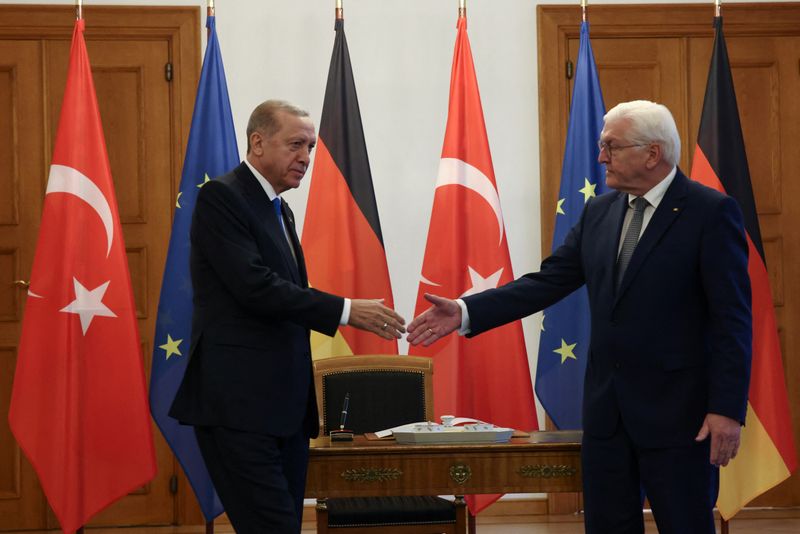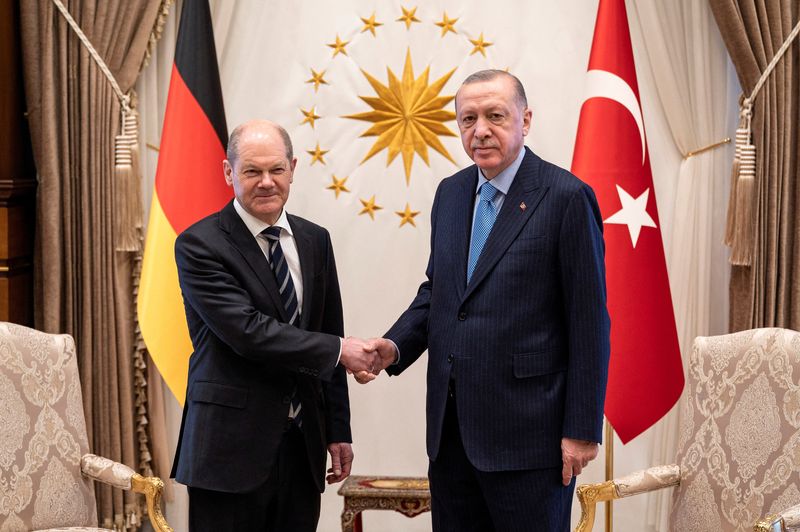By Andreas Rinke and Huseyin Hayatsever
BERLIN (Reuters) -Turkish President Tayyip Erdogan on Friday suggested that Germany supported Israel in the Gaza war out of guilt over the Holocaust and drew a contrast with Turkey, which he said was able to speak without bias.
"The Israeli-Palestinian war should not be evaluated with a psychology of indebtedness. I speak freely because we do not owe anything to Israel," Erdogan said at a joint news conference with Chancellor Olaf Scholz before the two leaders held private talks.
"Those who feel indebted to Israel cannot speak freely. We did not go through the Holocaust process, we don't have such situation, because our respect for humanity is different," the Turkish president said.
Erdogan said earlier this week that Israel was a "terror state" committing war crimes in Gaza and that its campaign against Hamas included "the most treacherous attacks in human history."
Erdogan's comment in Berlin went to the heart of Germany's post-war identity, which is based on deep atonement for the Holocaust. Germany systematically killed 6 million Jews and 5 million other victims during World War Two. Modern Israel was founded in 1948 as a safe haven for Jews.
Scholz did not respond directly to Erdogan's remarks but restated Germany's commitment to Israel's right to defend itself.
"If you know Germany, you know that our solidarity with Israel is beyond all question," Scholz said. "Israel has the right to defend itself. At the same time all lives are equally precious and the suffering in Gaza distresses us."
Erdogan's trip was his first visit to Germany in four years. Erdogan, whose party faces key local elections next year, could benefit from Scholz's backing for modernising Turkey's customs union with the European Union and visa-free EU travel for Turks.
Scholz, dealing with a court ruling that blew a 60-billion-euro hole in his budget, a coalition row over the economy and rising immigration, needs Ankara's help in stemming migration to the EU.
But the talks were overshadowed by the Israel-Hamas conflict. Hamas fighters on Oct. 7 surged into Israel, killing 1,200 and taking some 240 hostages. In retaliation, Israel invaded Gaza with a goal of eliminating Hamas, and Palestinian authorities have said more than 12,000 have died.
Germany has seen an uptick in antisemitism and Islamophobia since the conflict began and has faced criticism for making it hard to hold pro-Palestinian protests, which the government fears might be antisemitic.
FIGHTER PLANES
The two leaders sought to emphasise areas of agreement including the importance of their economic ties and support for a deal on Ukraine grain exports.
Scholz declined to respond to a question on whether he would approve the sale of the 40 Eurofighter warplanes that Turkey wants. His approval would be needed since Germany is a member of the British-French-Spanish consortium that makes them.
Erdogan said he could go elsewhere if Scholz did not agree.

"We can procure fighter jets from many other places," Erdogan said.
Berlin would also like to see Turkey give its final approval to Sweden's accession to the NATO military alliance. Though Erdogan has dropped his objections, the Turkish parliament has yet to ratify Sweden's membership.
